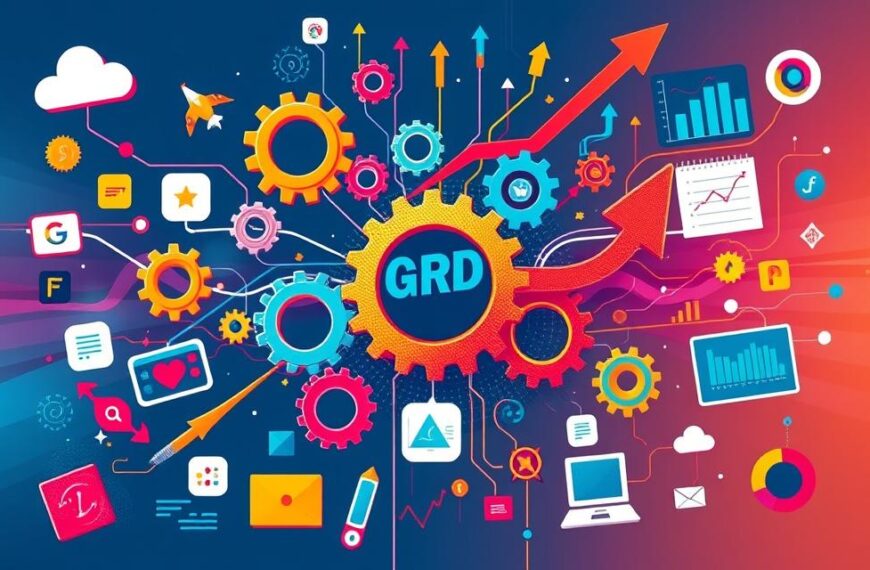AI technologies are changing how companies work, leading to innovation and growth in different sectors. They make operations more efficient and improve customer experiences. The AI market is expected to reach $1,339 billion by 2030. This shows how important AI is for business growth.
Companies are using AI to get ahead. They use smart chatbots and assistants for instant customer support. AI’s ability to analyse emotions helps in understanding customer needs better. This leads to more personal customer talks. Also, AI uses past data and trends to make accurate sales predictions.
Predictive analytics allow companies to foresee and use market changes. AI enhances efficiency and reduces mistakes in many areas. AI is key for companies to stay relevant in the future.
The Impact of AI Technologies on Business Operations
The AI impact on business operations changes how tasks and resources are managed. Adopting AI strategies helps businesses become more efficient and profitable. This is due to smarter processes. For example, Large Language Models (LLMs) and image generation models have changed the game. LLMs read and understand huge amounts of text, aiding in making quick decisions. Image generation helps to accurately find important information, which is key in many areas.
AI technologies are altering daily business routines, and it makes us think about their overall effects. Automation boosts productivity and lets employees focus on more important work. A study shows that 56% of businesses use AI to improve what they do, while 83% see AI as crucial in their plans for the future.
Data analysis plays a big role too. It helps companies make quick, smart choices by understanding lots of data. AI also makes shopping more personal with recommendations and chatbots, improving how customers feel when they interact with businesses.
When it comes to security, AI is very important. 51% of businesses use it to keep things safe from cyber threats and fraud. Tools like Microsoft’s COPILOT help with creating reports and presentations, showing how AI can really change the way businesses work.
In sum, AI is pushing industries into the future quickly. The global AI market is expected to grow massively by 2030. This underlines the big effect AI will have on how businesses run in the coming years.
| AI Application | Impact on Business Operations | Percentage Usage |
|---|---|---|
| Process Automation | Enhances operational efficiency | 56% |
| Cybersecurity | Improves protection against fraud | 51% |
| Customer Relationship Management | Personalises client interactions | 46% |
| Inventory Management | Optimises supply chain processes | 40% |
| Advanced Data Analytics | Facilitates informed decision-making | N/A |
Enhancing Customer Experience through AI Innovations
AI has changed how we handle customer experience. A Google report shows a big jump in AI projects, up seven times. This shows more people want to use AI to do better. About 65% of leaders in customer experience think AI is key for staying ahead.
Chatbots are a big step forward. They give quick help, which 68% of customers like for fast answers. This quickness makes customers happier. AI lets companies quickly look at lots of data. This helps them make customer service better.
AI helps businesses give more personal service to many people. With AI, companies can understand what customers feel in real time. This lets them change how they talk to customers. Using tech like RPA makes things run smoother. This makes customers happier with the service.
When bringing in AI, companies must be careful with data privacy and security. They need a good plan and to teach their staff to work with AI. Making AI that understands how people feel helps connect with customers better. Looking at how well issues are solved, keeping customers, and making more money helps see if AI is working.
To really use AI well, companies need to be open to new ideas. Having a clear customer goal helps make services better with AI. Using many ways to talk to customers, like TikTok and Instagram, makes customers more loyal and values the brand more.
Optimising Sales and Marketing Efforts with AI
AI is changing how sales and marketing work, bringing new ways for sales optimisation. It helps automate finding and sorting potential customers effectively. By checking big datasets, it finds leads that boost sales, raising conversion rates.
Predictive analytics lets companies predict sales trends well. They can use past sales and customer actions to use resources better and grab market chances. Money put into AI has jumped, showing a big interest in AI strategies.
Looking ahead, AI in marketing seems set to grow. 90% of business leaders plan to use generative AI often in the next two years.
Companies that grow their market share by 10% a year often use state-of-the-art sales tech and focus on personal touch. With big names like Salesforce and Amazon using AI to get ahead, the benefits are obvious.
Using predictive analytics and AI, firms need good teamwork and smart data handling for success. For more on using these advancements, see this resource.
Streamlining Business Operations
In this day and age, making operations efficient is critical for businesses. Many are now using AI automation to make their processes better. Technologies like Robotic Process Automation (RPA) are changing the game in back-office tasks. They make repetitive work automatic, letting people focus on more important strategies that boost productivity.
UiPath sets a great example with its 10,000 customers globally. It offers powerful tools for businesses big and small, including giants like Verizon and Coca-Cola. By simplifying complex jobs, these tools increase efficiency in many fields.
Predictive analytics is revolutionising supply chain management. It helps with foreseeing demand and making sure stock levels are just right. IBM’s advanced tools provide process mining, helping businesses stay agile. This flexibility keeps operations running smoothly, cutting down on waste and surplus stock.
Kofax is bringing AI into handling documents, making it easier to deal with data from digital and traditional sources. With Optical Character Recognition (OCR), data management becomes more precise and swift. This boosts efficiency and leads to smarter decisions.
AI technologies bring real advantages to different areas. In recruitment, AI can cut resume screening time by half. In retail, AI analysis has lifted sales and kept 15% more customers coming back.
Using AI in everyday tasks helps businesses refine their processes. They can sift through huge data sets for useful insights. This gives them a leg up, making them more efficient and competitive in the current market.
Transforming Human Resources with AI Capabilities
AI is reshaping HR by automating many processes. It improves efficiency and boosts employee engagement. AI in recruitment changes how we hire, making it fairer. HRIS platforms with AI help screen resumes without bias, ensuring diversity. This lets HR teams spend more time on big-picture work.
Chatbots and virtual assistants are now key for engaging employees. They answer common questions, improving communication. This means HR staff can tackle more important tasks. AI helps offer personalised support and training advice to employees, based on their needs.
Using predictive analytics in HR is a big step forward. It spots risks and chances in the workforce, helping to keep employees happy and on board. These tools forecast staff turnover, spot top talent, and improve hiring strategies.
The move to include AI in HRIS has been widely praised. A survey found that 88% of global companies use AI in HR. AI cuts costs by handling routine tasks, making HR more effective. Predictive analytics also provide instant feedback on performance, making employees feel valued.
AI’s data-focused method boosts HR processes and aids strategic planning. With insights into staff performance and engagement, firms can craft better strategies. Even with data privacy and bias risks, AI’s advantages are clear. It promises a more innovative and agile HR future.
Which technology will enable businesses to expand AI
The world of tech is changing fast, affecting how firms use AI to get better and beat the competition. It’s important for companies to get the hang of new AI tools. These tools help them grow and stand out in the market.
Emerging AI Solutions for Competitive Advantage
AI is key for companies looking to stay ahead. With a huge $307 billion expected to be spent on AI by firms next year, the leap to $632 billion by 2028 is huge. This means a yearly growth of 29.0%. Investing in AI sparks new ideas. It brings about tools that make work smoother, like handling queries smartly and giving advice on what to do next. With two-thirds of companies happy with just under a 50% profit from AI projects, it’s clear they value what works over big promises.
Integration of Real-time Data Analysis
Being able to analyse data on the spot is a game-changer for businesses. It helps them adapt quickly and make better choices. Sectors like banking and shops gain a lot from this, as it helps catch fraud quicker and manage stocks better. AI’s impact could add up to $19.9 trillion to the global economy by 2030. This makes it a key strategy for any business wanting to succeed.
| Year | Projected AI Spending (in billion USD) | Cumulative Global Economic Impact (in trillion USD) |
|---|---|---|
| 2023 | 307 | 19.9 |
| 2028 | 632 | N/A |
| 2030 | N/A | 19.9 |
As firms keep up with tech advances in AI, they find new ways to stay competitive. This ongoing evolution is making a big difference in many industries.
Challenges and Considerations in AI Implementation
Businesses face big challenges as AI technology rapidly grows. Implementing AI can change how decisions are made, streamline tasks, and improve how customers feel. Yet, we must think about ethics and data privacy seriously.
Data privacy is a huge concern as businesses collect lots of customer info for AI. It’s vital to manage this data with great care. Many businesses face issues with AI bias. Such bias can mess up the accuracy in 85% of cases, leading to fairness and openness issues.
Setting up AI can also meet resistance and a lack of skilled workers. By 2025, we might need 250,000 more data experts. Companies use lots of SaaS apps, making it hard to blend different data sources smoothly.
Making smart strategic choices is key to using AI well. Sadly, many leaders miss chances to mix AI into their plans. This slows down growth and new ideas. Only a quarter of businesses truly blend ethics into their AI plan.
| AI Implementation Challenges | Impact |
|---|---|
| Data Privacy Concerns | Risk of breaches and loss of customer trust |
| Bias in AI Algorithms | Reduced accuracy and fairness of outcomes |
| Talent Shortage | Difficulty in finding skilled professionals to manage AI |
| Integration Issues | Complicated systems lead to inefficiency |
| Ethical Implementation | Need to address moral implications and compliance |
| ROI Measurement | Only 11% of companies see substantial returns |
By thinking carefully about these AI challenges and putting ethics and privacy first, businesses can use AI more responsibly and effectively.
Conclusion
The future of AI is set to change how businesses grow and innovate. It brings incredible efficiency and improves how customers experience services. By using data analytics, companies can now make choices that used to be impossible, preparing them for bigger success.
Retailers can also use AI to keep just the right amount of stock and make their supply chains better. This approach has been seen with companies like Amazon, leading to higher sales through smarter selling techniques. However, to truly benefit from AI, businesses must manage their data well and act ethically.
With 39 percent of small businesses ready to use AI, it’s clear that updating team skills is essential. Those who welcome this change will stay ahead of the competition and tackle market changes more effectively. To discover more on how AI is transforming business, click here.
FAQ
What are AI technologies?
AI technologies involve tools and software that boost business by making things faster and smarter. These tools include learning systems, smart chatbots, and robots that do tasks automatically.
How do AI technologies impact business operations?
AI transforms business by making work smoother and quicker. It helps in automating routine jobs. And it offers insights into what customers want and market trends.
What innovations are improving customer experience through AI?
Innovations like smart chatbots and virtual helpers greatly improve how customers feel. They offer quick help and can handle lots of questions. AI also sees what customers like, helping to shape offers.
How can AI optimise sales and marketing efforts?
AI boosts sales and marketing by automating how we find and look after leads. It looks at lots of data to predict sales trends. This helps businesses focus their efforts where it counts.
What role does AI play in streamlining business operations?
AI uses smart automation, like RPA, to take over repetitive work. This frees up teams for big-picture projects. It leads to better work efficiency.
In what ways is AI transforming human resources?
AI is changing HR by making hiring automated and tailoring how we work with employees. It scans candidates fairly and tracks what keeps employees happy. This reduces bias and improves workplace morale.
What are the emerging AI solutions for businesses?
New AI tools include advanced language models and instant data checks. These are important for quick decisions and staying agile. They help businesses keep up with fast changes.
What challenges do businesses face when implementing AI?
When bringing in AI, businesses worry about keeping data safe, ethical issues, and biases in software. It’s key to have strong rules for data and to keep AI uses clear and fair.


















